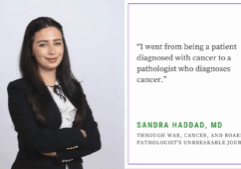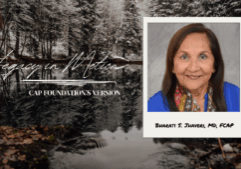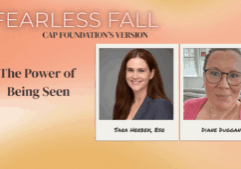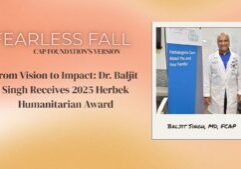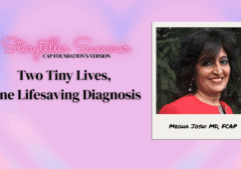Q&A: CAP President Dr. Karcher on Foundation Support, Alignment

The CAP Foundation has many supporters and friends that make up the membership and leadership of the College of American Pathologists. And throughout the Foundation’s history, the organization has had the privilege to work with many involved leaders and CAP presidents. That list now includes Donald S. Karcher, MD, FCAP, who was inaugurated as the 38th CAP president during the CAP23 annual meeting on October 7, 2023.
The CAP Foundation sat down with Dr. Karcher to discuss the goals for his presidency, how he thinks those work in conjunction with the CAP Foundation, and more.
How did you first hear of the CAP Foundation?
I heard of the Foundation many years ago, but maybe one of the more memorable experiences as I was learning more about the Foundation was getting to know Gene Herbek, MD, FCAP. Dr. Herbek had reached out to me to consider running for the Board of Governors and from that first conversation, he and I got to be good friends. And as I got to know him better, I got to know the Foundation better.
What in the Foundation’s mission speaks to you most as a pathologist and as the president of the CAP?
The current goals of the Foundation really align very closely with things that I’m personally very interested in, and things that I’ve set as priorities for my presidency. One is attracting more young people to pathology as a career and supporting them once they’ve started their careers. That is something that I know the Foundation has done very well and is doing increasingly well.
Another thing that has always been very important to me, and was in my inaugural address, is that I’m very much in favor of the CAP’s international footprint expanding. I want to make sure that what the CAP has to offer is increasingly available in under-resourced parts of the world and the Foundation does an amazing job of that. I want that to expand to other parts of the CAP, not just relying on the Foundation. But I think the Foundation has really led the way in that aspect of making sure that under-resourced pathologists and under-resourced laboratories can benefit from everything we have to offer.
The final thing is that See, Test & Treat gives people who don’t have access to good health care incredibly important services, but it also increases the visibility of pathology and pathologists. In every community where there’s a See, Test & Treat, it’s helping many women who wouldn’t have access to great care. It’s also showing that community what pathologists do and how what we do benefits patients directly.
I think those aspects of what the Foundation does aligns very much with my goals as president and what I think the CAP should be all about.
In what ways has the CAP Foundation’s emphasis on prevention screening in underserved communities aligned with and supported the CAP’s objectives in health care equity and accessibility?
Everything that we are about as an organization—I also said this in my inaugural address—should be focused on the patient. If we focus on the patient, everything else falls into place. The Foundation does that, certainly through the services provided by See, Test & Treat, but so many other things that the Foundation does that I think the CAP should be all about, including making sure that people know what we do. That more patients know what we do, that more of our fellow physicians know what we do and how we can help them give better care to our patients.
And then, finally, attracting and training the next generation of pathologists is incredibly important because that, of course, benefits patients down the road as well.
What do you find unique about the CAP Foundation?
I always refer to the Foundation as the heart and soul of the CAP. The Advocacy arm is the voice of pathologists, and CAP education gives pathologists the resources to do an even better job for patients. And all the quality programs serve patients directly as well as serving our members and customers.
As a longstanding supporter, what message would you share with colleagues or potential supporters who might be hesitant to contribute to the CAP Foundation?
You know, the Foundation directly benefits patients, but your donation also supports our profession. It supports our profession in terms of recruiting, supports the training of our residents giving them a chance to go places they might not otherwise have a chance to go, and also expanding a lot of the positive things we do around the world. What better way can you think of donating your money than benefitting patients and our profession?
Why do you place a high value on the CAP Foundation’s international initiatives, and how do you believe these efforts contribute to global health improvements?
For one thing, I’m following the example of Gerald Hansen, MD, FCAP, the former CAP board member, long-term board member of the Foundation, and also the person who initiated the Global Pathology Fund. Gerry and I are friends and I was very inspired by his desire to bring pathology services and our resources to pathologists in under-resourced parts of the world.
But I also feel very strongly that the CAP is an international organization and being an international organization gives us a unique opportunity to benefit pathology practice and patients worldwide. We are the only pathology organization in the US, or frankly anywhere in the world, that has the resources and reach to bring what we have to offer to the entire world, including parts of the world that can’t really afford to pay for it.
Looking forward, what developments in pathology excite you the most, and how do you see the CAP Foundation playing a role in advancing these areas and supporting the CAP’s goals?
One thing that immediately comes to mind is emerging new technology. And a lot of the grants that the Foundation provides will help residents and CAP Fellows have access to research opportunities to develop new biomarkers or get involved in developing new immunohistochemical stains that will benefit our patients in the future.
We are beginning to bend the curve in this country on getting more students interested in pathology. As you know the CAP had an initiative that we called the Pipeline Initiative. We’ve changed the name to the Future Pathologists Initiative. It has really begun bending the curve in recruiting, and I’m very proud of that.
Although the Foundation is a separate entity from the CAP, we are very aligned on the things that the Foundation and the CAP regard as very important both for our patients and for the profession of pathology.
This conversation has been edited for length and clarity.
More Stories
Why Donate
Every person deserves a diagnosis. Support care beyond the microscope. Expand access to pathology-locally and globally.


